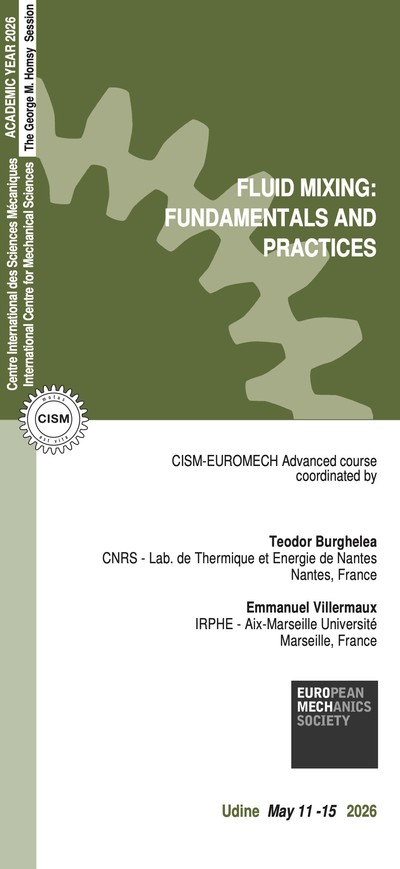Geers MGD, Peerlings RHJ, Hoefnagels JPM, Kasyanyuk Y, 2009. On a Proper Account of First- and Second-Order Size Effects in Crystal Plasticity. Advanced Engineering Materials 11:143-7.
Groen JP, Sigmund O, 2018. Homogenization-based topology optimization for high-resolution manufacturable micro-structures. Int. J. Numerical Meth. Eng. 113:1148-63.
Labusch M, Schröder J and Lupascu DC, 2019. 3D magnetostrictive Preisach model for the analysis of magneto-electric composites. Archive of Applied Mechanics 89:1011-30.
Marino M, Wriggers P, 2019. Micro-macro constitutive modeling and finite element analytical-based formulations for fibrous materials: A multiscale structural approach for crimped fibers. Comput. Methods Appl. Mech. Eng. 344:938-69.
Marino M, Hudobivnik B, Wriggers P, 2019. Computational homogenization of polycrystalline materials with the Virtual Element Method. Comput. Methods Appl. Mech. Eng. 355:349-72.
Rokoš O, Ameen MM, Peerlings RHJ, Geers MGD, 2019. Micromorphic computational homogenization for mechanical metamaterials with patterning fluctuation fields. J. Mech. Phys. Solids 123:119-37.
Stupkiewicz S., 2007 Micromechanics of Contact and Interphase Layers, Springer Berlin Heidelberg New York.
Tuma K, Stupkiewicz S, Petryk H, 2018. Rate-independent dissipation in phase-field modelling of displacive transformations. J. Mech. Phys. Solids 114:117-42.
Wessels H, Weißenfels C, Wriggers P, 2018. Metal particle fusion analysis for additive manufacturing using the stabilized optimal transportation meshfree method. Comput. Methods Appl. Mech. Eng. 339:91-114.
Wu J, Aage N, Westermann R, Sigmund O, 2018. Infill Optimization for Additive Manufacturing - Approaching Bone-like Porous Structures, IEEE Trans. Vis. Comput. Graph 24:1127-40.
6 lectures on: Mechanics of mechanical metamaterials and size-dependent effects: computational methods for instability-driven metamaterials; comparisons between full-scale simulations and a micromorphic homogenization approach; modelling of size-dependent microsystems with application to strain gradient plasticity models used for metallic thin films and MEMS applications.
6 lectures on: General principles for the development of constitutive laws and multiscale/multiphysics models: basic mathematical requirements; micromechanical approach for material homogenization (analytical and quasi-analytical methods); thermodynamic balance for chemo-mechanical systems with applications to smart hydrogels and biological tissues.
6 lectures on: Magneto-mechanical problems: physical basics of magnetism at the atomistic scale and exchange energies; macroscopic hysteresis curves given by magnetocrystalline anisotropies; balance laws and continuum mechanical approach; magneto-mechanical constitutive models; conforming H(curl) finite element formulations.
6 lectures on: Topology optimization for multiscale and extremal material design: numerical homogenization techniques, adjoint-based sensitivity analyses and gradient-based design update schemes for topology optimization; optimal microstructures, relations to additive manufacturing infill and applications in acoustic, electromagnetic and optical wave propagation.
6 lectures on: Mechanics of sharp and diffuse interfaces: laminated microstructures; evolution of microstructures and computational approaches for propagating interfaces; interfacial energy and size effects with application to martensitic microstructures and instabilities of Lüders-band type in shape memory alloys.
6 lectures on: Computational modeling in material mechanics: the virtual element method (VEM) with applications to polycrystalline structures and damage mechanics; continuum-based frameworks for finite deformation phase change problems; mesh-free methods with applications to selective laser melting in additive manufacturing.
The registration fee is 600.00 Euro + VAT*, where applicable (bank charges are not included). The registration fee includes a complimentary bag, four fixed menu buffet lunches (on Friday upon request), hot beverages, downloadable lecture notes and wi-fi internet access.
Applicants must apply at least one month before the beginning of the course. Application forms should be sent on-line through the following web site: http://www.cism.it. A message of confirmation will be sent to accepted participants. Applicants requiring assistance with the registration should contact the secretariat at the following email address cism@cism.it.
Applicants may cancel their course registration and receive a full refund by notifying CISM Secretariat in writing (by email to cism@cism.it) no later than two weeks prior to the start of the course.
Cancellation requests received during the two weeks prior to the start of the course will be charged a 50.00 Euro handling fee. Incorrect payments are also subject to a 50.00 Euro handling fee.
A limited number of participants from universities and research centres who are not supported by their own institutions can be offered lodging and/or board, if available, in a reasonably priced hotel or student guest house.
Requests should be sent to CISM Secretariat by July 27, 2020 along with the applicant's curriculum and a letter of recommendation by the head of the department or a supervisor confirming that the institute cannot provide funding. Preference will be given to applicants from countries that sponsor CISM.
Information about travel and accommodation is available on the web site www.cism.it, or can be mailed upon request.
* Italian VAT is 22%.





